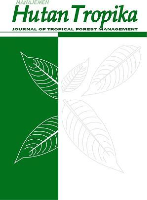
Jurnal Manajemen Hutan Tropika
Scope & Guideline
Cultivating collaboration in ecological research.
Introduction
Aims and Scopes
- Tropical Forest Ecology and Biodiversity:
The journal focuses on the ecological dynamics of tropical forests, including species diversity, habitat suitability, and the impact of various management practices on forest health and biodiversity. - Sustainable Forest Management and Policy:
Research often addresses the principles and practices of sustainable forest management, exploring the implications of policy frameworks, community involvement, and stakeholder engagement in forest governance. - Socio-Economic Aspects of Forestry:
The journal investigates the socio-economic factors influencing forest management, including traditional ecological knowledge, local livelihoods, agroforestry systems, and the role of indigenous communities in sustainable practices. - Climate Change and Environmental Impact:
A core area of focus is the relationship between forest management practices and climate change, including studies on carbon storage, land use changes, and environmental degradation. - Innovative Management Techniques and Technologies:
The journal highlights innovative approaches and technologies in forest management, including remote sensing, GIS applications, and community-based management strategies.
Trending and Emerging
- Community-Based Forest Management:
There is a growing trend towards research on community-based approaches to forest management, emphasizing the role of local communities in sustainable practices and conservation efforts. - Climate Change Mitigation Strategies:
Emerging themes include research on strategies for climate change mitigation through forestry, such as carbon sequestration and adaptation practices in forest ecosystems. - Biodiversity Conservation and Restoration:
An increased focus on biodiversity conservation and restoration efforts reflects a response to the urgent need for ecological resilience in tropical forests. - Technological Innovations in Forestry:
The journal is showcasing more studies on technological innovations, including the use of remote sensing, drones, and data analytics in forest monitoring and management. - Socio-Ecological Systems and Resilience:
Research exploring the interplay between social and ecological systems is gaining traction, highlighting the need for integrated approaches to address complex forest management challenges.
Declining or Waning
- Traditional Forestry Practices:
Research exploring traditional forestry practices and their applications has decreased, possibly due to a growing emphasis on modern techniques and scientific approaches to forest management. - Single-Species Management Studies:
There has been a noticeable reduction in studies focusing exclusively on single species management, as the journal increasingly embraces ecosystem-level analyses and biodiversity-focused research. - Non-Timber Forest Products (NTFPs):
While still relevant, studies specifically centered on NTFPs have waned in frequency, potentially overshadowed by broader investigations of ecosystem services and multifunctional forest management. - Conventional Land Use Practices:
Research on conventional land use practices, such as monoculture plantations, is declining as the journal shifts towards sustainable and integrated land-use strategies. - Urban Forestry Initiatives:
Although urban forestry remains important, the focus on urban forest management has decreased, with a shift towards more rural and community-based forest management studies.
Similar Journals

Forestist
Innovating ecological research for a greener tomorrow.Forestist, published by AVES, is a pivotal open-access journal dedicated to the field of Forestry, providing a platform for researchers, professionals, and students to explore cutting-edge developments and research within the discipline since 1980. Operating from Turkey, this journal offers a unique opportunity for scholars to share their findings with a broad audience, contributing to the global discourse on sustainable forest management, conservation practices, and ecological research. With an impressive impact factor and a current categorization in the Q3 quartile for 2023, Forestist ranks among the essential resources in Agricultural and Biological Sciences, particularly within the realm of Forestry, as indicated by its Scopus ranking of #119 out of 174 journals. This publication is committed to fostering open access to knowledge, making research freely available while encouraging innovative studies that address the pressing challenges in forestry and environmental science.
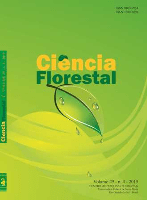
CIENCIA FLORESTAL
Advancing Forestry Knowledge for a Sustainable FutureCIENCIA FLORESTAL is a premier open-access journal published by the Universidade Federal de Santa Maria, dedicated to advancing knowledge in the field of Forestry. Established in 1991, it provides a vital platform for researchers, professionals, and students to disseminate innovative research findings and methodologies. With an ISSN of 0103-9954 and an E-ISSN of 1980-5098, this journal offers extensive access options for a global audience, ensuring that key scientific discoveries in forest science are available to all. The journal is recognized for its contribution to the scholarly community, currently ranked in the Q3 category within the Forestry discipline, reflecting its commitment to quality and relevance in research. CIENCIA FLORESTAL covers a wide array of topics related to forestry practices, environmental sustainability, and biological sciences, making it an essential resource for those seeking to deepen their understanding of forest ecosystems and their management. Whether you’re a seasoned researcher or a student embarking on your academic journey, CIENCIA FLORESTAL stands as an invaluable asset in the exploration and development of forestry sciences in Brazil and beyond.
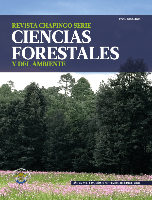
Revista Chapingo Serie Ciencias Forestales y del Ambiente
Fostering collaboration in the pursuit of ecological excellence.Revista Chapingo Serie Ciencias Forestales y del Ambiente, published by Universidad Autónoma Chapingo, serves as a prominent platform for scholars and practitioners in the fields of Ecology and Forestry. Established in 2001, this open access journal has made significant strides in disseminating research that addresses pressing environmental issues, particularly within the Mexican context. With an ISSN of 2007-3828 and E-ISSN of 2007-4018, it has been recognized for its contributions, earning a Q3 ranking in both Ecology and Forestry categories as of 2023. The journal is pivotal in fostering collaboration and knowledge exchange among researchers, professionals, and students dedicated to understanding and preserving forest ecosystems. Access to its rich content is unrestricted, enhancing visibility and impact for innovative research and practical applications in sustainable management and conservation practices.

Central European Forestry Journal
Exploring the depths of Central European forestry science.Central European Forestry Journal, published by SCIENDO, is a pivotal platform dedicated to advancing research and knowledge in the field of forestry. Since its inception in 2009, this Open Access journal has provided scholars and practitioners with unrestricted access to cutting-edge research findings, promoting collaboration and innovation within the forestry community. Based in Poland, the journal serves as a crucial resource for researchers, professionals, and students alike, addressing critical topics relevant to the management, conservation, and sustainable utilization of forest resources. The journal holds a commendable Q2 ranking in Forestry, with a notable rank of 51 out of 174 and a 70th percentile in Scopus's Agricultural and Biological Sciences category. With converged publication from 2017 to 2024, the Central European Forestry Journal represents an essential avenue for disseminating knowledge and fostering dialogue in an increasingly important field.

Forest and Society
Fostering collaboration for forest sustainability.Forest and Society is a premier peer-reviewed journal that serves as a significant platform for researchers, practitioners, and policy-makers in the fields of forestry, geography, and social sciences. Published by the Faculty of Forestry at Universitas Hasanuddin in Makassar, Indonesia, this Open Access journal has been committed to disseminating high-quality research since its inception in 2017. With an impressive impact profile, as evidenced by its Q1 quartile ranking in Forestry and Political Science for 2023, Forest and Society effectively connects innovative research with pressing global issues related to forest management and sustainable development. The journal's objectives include fostering interdisciplinary collaboration and driving insightful discussions around conservation practices and socio-political dimensions of forest governance. By providing unhindered access to invaluable resources, Forest and Society aims to empower the academic community and enhance the sustainable stewardship of forest resources.

BOIS ET FORETS DES TROPIQUES
Exploring the Heart of Tropical EcosystemsBOIS ET FORETS DES TROPIQUES is a distinguished journal published by CIRAD-CENTRE COOPERATION INT RECHERCHE AGRONOMIQUE POUR, based in France. The journal is committed to disseminating high-quality research in the domains of ecology, forestry, and environmental science, reflected by its impressive ranking in multiple Scopus categories, including Q2 in Forestry and Q3 in Ecology. With an ISSN of 0006-579X and an e-ISSN of 1777-5760, BOIS ET FORETS DES TROPIQUES serves as a vital platform for scholars and practitioners to explore and share insights about tropical forests and their ecosystems. Although it operates under a subscription model without open access options, the journal plays a crucial role in advancing research and practices essential for sustainable forest management and biodiversity conservation in tropical regions. Its ongoing publication from 2010 to 2024 ensures a continuous contribution to the academic community, fostering a deeper understanding of ecological dynamics and promoting innovative approaches within the field.
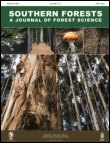
Southern Forests-A Journal of Forest Science
Driving Progress in Forest Science and SustainabilitySouthern Forests: A Journal of Forest Science, published by Taylor & Francis Ltd, serves as a vital platform for scholarly discourse in the field of forestry. With a robust ISSN of 2070-2620 and E-ISSN of 2070-2639, this journal highlights cutting-edge research and vital advancements from 2008 to 2024. Based in the United Kingdom, it continues to make significant contributions, evidenced by its current Q3 ranking in the forestry category of Scopus as well as its rank of 94 out of 174 in Agricultural and Biological Sciences. This journal caters to a diverse audience of researchers, professionals, and students, providing access to high-quality articles that promote sustainable forest management and ecological studies. Despite being classified as a non-open access journal, it remains a key resource, ensuring accessibility to crucial information that addresses both local and global forest challenges.
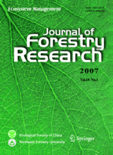
JOURNAL OF FORESTRY RESEARCH
Elevating forestry studies to new heights of excellence.JOURNAL OF FORESTRY RESEARCH, published by Northeast Forestry University in China, stands as a pivotal platform for advancing the field of forestry science. With an ISSN of 1007-662X and an E-ISSN of 1993-0607, this esteemed journal has maintained its commitment to disseminating high-quality research since its inception in 1997, converging into a recognized authority through the years. Currently boasting a Q1 ranking in the Forestry category for 2023, it ranks 18th out of 174 journals in its field on Scopus, highlighting its vital role in shaping contemporary forestry studies. The journal focuses on a broad spectrum of topics pertinent to forestry, including sustainable forest management, ecology, and conservation efforts, making it an indispensable resource for researchers, professionals, and students alike. Although it is not an open-access publication, the insights shared within its pages promise to contribute significantly to the advancement of knowledge and practices in forestry. The journal's significant impact and relevance are underscored by its operations from Harbin, People's Republic of China, where it continues to foster scholarly communication in the world of forestry research.

Small-Scale Forestry
Innovating forest management for a sustainable future.Small-Scale Forestry, published by Springer, is a leading journal dedicated to advancing knowledge and research in the field of forestry, focusing particularly on sustainable practices and management of small-scale forest systems. With an ISSN of 1873-7617 and E-ISSN 1873-7854, this esteemed journal has established its significance in the academic community, evidenced by its Q2 ranking in Forestry and its position within the 69th percentile in Scopus. This journal welcomes contributions that span various themes within forestry, encompassing ecological, economic, and social dimensions, thus appealing to researchers, practitioners, and students alike. Although Small-Scale Forestry does not currently operate under an open access model, it provides critical insights that contribute to the global discourse on forest management, sustainability, and biodiversity, fostering a greater understanding of the vital role that small-scale forestry plays in environmental stewardship.

FORESTRY
Empowering sustainable forestry through rigorous scholarship.FORESTRY is a prestigious journal dedicated to the advancing knowledge and innovative practices in the field of forestry, published by Oxford University Press. Established in 1927, it encompasses a rich history of scholarly contributions and has evolved to maintain its relevance, addressing contemporary issues and research in forestry and related disciplines. With an impressive Q1 ranking in the category of Forestry, this journal holds a notable position within the Scopus rankings, being placed 20th out of 174 in the Agricultural and Biological Sciences domain, highlighting its significant impact with an 88th percentile standing. Researchers, professionals, and students can access critical insights into forestry management, ecology, and policy, facilitating informed decision-making and fostering sustainable practices. While Open Access options are currently not available, the journal's rigorous peer-review process ensures the publication of high-quality research that contributes both to academic advancement and practical applications in forestry worldwide. The comprehensive coverage from 1927 to 2024 makes FORESTRY an invaluable resource for anyone invested in enhancing the field of forestry.